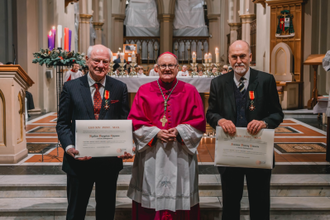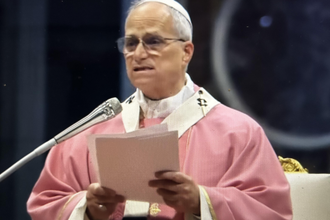Vatican praises Oscar Wilde

Oscar Wilde, whose flamboyant behaviour scandalised Britain in the 19th century, has won an endorsement from the Vatican.
L'Osservatore Romano, the Vatican's official newspaper, yesterday declared that the author of The Importance of Being Earnest was more than "an aesthete and a lover of the ephemeral".
In a review of a new book about him, the paper said Wilde was: "one of the personalities of the 19th century who most lucidly analysed the modern world in its disturbing as well as its positive aspects".
While acknowledging that Wilde was a rebel who delighted in shocking Victorian England, L'Osservatore said he was also a profound thinker who spent his professional life asking "what was true and what was false".
Two years ago, some of Wilde's best known aphorisms were included in a book of witticisms for Christians collated by the Vatican's head of protocol, Father Leonardo Sapienza. The book includes: "I can resist everything except temptation", and: "The only way to get rid of temptation is to yield to it."
Fr Sapienza said that although Wilde had lived "somewhat scandalously", he had written some "razor-sharp maxims" which carried an important moral message.
Wilde married Constance Lloyd in 1884 and they had two sons, but in 1891 he began a relationship with the much younger Lord Alfred Douglas.
In April 1895, Wilde sued Douglas's father, the Marquis of Queensberry, for libel, after the Marquis had accused him of being homosexual. Wilde lost and, after salacious details of his private life were revealed during the trial, was arrested and tried for gross indecency. He was sentenced to two years of hard labour in Reading Gaol.
Wilde had always been interested in Catholicism. In 1877, as a young man while on a visit to Italy, he had secured an audience with Pope Pius IX. During his time in prison he read the works of St Augustine, Dante, and Newman. When he was released in 1897, with his reputation destroyed and in frail health, he moved to Paris and was baptised into the Catholic Church shortly before he died, three years later.
L'Osservatore Romano described the writer's conversion as a "long and difficult path" to the Promised Land - "a path which led him to convert to Catholicism, a religion which, as he remarked in one of his more acute and paradoxical aphorisms, was 'for saints and sinners alone - for respectable people, the Anglican Church will do'".















